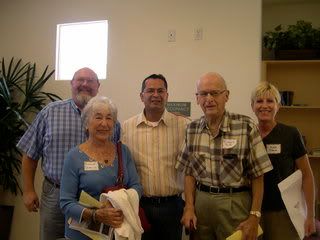The 80th Assembly District in California is one of the best pickup opportunities this year, and we have just the transformational candidate to make it happen. Manuel Pérez is a hands-on, no bs, Harvard-educated community organizer from the heart of the Coachella Valley, a direct, unapologetic progressive with experience in building a just and healthy society. He won’t promise loyalty in Sacramento in exchange for support, he’s getting his mojo the time-honored way: walking precincts, meeting with more union review committees, and he just participated in a podcast on Calitics.
I’ve been posting on this race since last May, and have yet to compile the best quotes nor list the endorsers adequately. Let’s kick it off with the California Labor Federation, AFL-CIO:
Art Pulaski, Executive Secretary of the California Labor Federation, AFL-CIO:
Manuel Perez knows first hand the struggles of working families and will be a champion of healthcare, education and creating new jobs in the State Assembly.

What Folks Are Saying About Manuel Perez, Democrat for the 80th Assembly District:
(Update, CA Federation of Teachers’ just chimed in)
Marty Hittelman, President of the California Federation of Teachers:
Manuel Perez is a real education champion – he’s a former classroom teacher, earned a Masters in Education from Harvard University and serves as a school board member helping struggling schools to succeed. Manuel fights every day to give kids the educational tools they need to succeed in life and in the workplace.
Steve Clute, Former California State Assemblyman:
(Perez) has the heart – corazón – and passion to truly represent the people.
Fred W. Lowe, Business Manager/Secretary Treasurer for Laborers’ Local 777:
He is a strong and clear voice for the communities he serves, and is willing to fight for fundamental rights; fair pay; fair treatment and justice; protections and security for our families; access to health care; better education and better working conditions for the residents of the 80th Assembly District.
Harvard Graduate School of Education, announcing Manuel Perez as a recipient of the HGSE Alumni of Color Achievement Award:
Mr. Perez is being recognized for his work, which addresses issues of race and education in ways that offer new frames of thought and practice, and evidences a commitment to promote meaningful strategies to affect change and to improve educational opportunities for people of color.
David Dayen, blogger at Calitics, Hullaballoo, and The Right’s Field:
This is someone who hasn’t waited around for higher office to make a difference in his community; he’s rolled up his sleeves and dived in. As a director for the Borrego Community Health Foundation, he’s created one of the first diabetes resource centers in the desert region and has delivered health services to underserved regions. As a researcher for the California Institute for Rural Studies, he put together a groundbreaking study on women’s reproductive health issues in Imperial County, where women have little opportunities and resources to manage their own health. With Promotores, he’s part of a group of community-based leaders devoted to teaching about health issues and making sure people in the community get the facts about programs at their disposal. As a schoolteacher he started his school’s first ever Chicano Studies program designed to allow students to learn history from their perspective. With the Eastern Coachella Valley Social Change Collaborative, he identified farm workers living in the area and trained them to be community leaders themselves. Believe it or not, he’s only 34.
…
Manuel Pérez is not only a perfect fit for this district, providing an opportunity to retake this seat and get us closer to 2/3. He represents a new generation of Hispanic-Americans who are dedicated to working for change from the bottom up. He would bring to Sacramento a unique set of skills, as someone who can build coalitions and train a group of leaders far into the future. There are primary candidates on the Democratic side for this seat who appear to be very nice. I don’t think anyone combines the résumé and the hope for the future more than Manuel Pérez.
Joe Murillo, President, Coachella Valley Unified School District Board:
(Perez) likes to see improvement. He is not a man for the status quo.
Partial List of Endorsers:
California Labor Federation, AFL-CIO
United Domestic Workers
California Teachers Association
SEIU State Council
Laborers (LIUNA)
California Nurses Association
AFSCME
California Medical Association
Former Congressman Esteban Torres, 34th Congressional District, California
Congressman John Conyers Jr. 14th Congressional District, Michigan
Congressman Raul Grijalva, 7th Congressional District, Arizona
State Senator Gloria Romero
Joe Coto, Assemblyman and Latino Caucus Chair
Steve Clute, Former Assemblyman and 80th AD Candidate, 2006
Tony Cardenas, Former Assemblyman, current Councilman City of Los Angeles
Paul M. Rasso, Candidate, 64th Assembly District
Victor Carrillo, Supervisor, Imperial County Board of Supervisors
Ray Castillo, Former Mayor, El Centro
Joel Perez, Former School Board Trustee, El Centro Elementary School District
George Nava, Council Member, City of Brawley
Chuck Valenzuela, Former Mayor and Treasurer, Brawley
Joe Murillo, President, Coachella Valley Unified School Board
Eduardo Garcia, Mayor, City of Coachella
Steve Hernandez, Council member, City of Coachella
Tim Brown, City Manager, City of Coachella
Steve Brown, Assistant City Manager, City of Coachella
Carlos Campos, Attorney, City of Coachella
Jackie Lopez, Executive Director, City of Coachella Chamber of Commerce
Carlos Ortega, City Manager, City of Palm Desert
Mike Wilson, Councilmember, City of Indio
Maria Machuca, Former Chair, Mecca Community Council
Sal Alejo, Member, Mecca Community Council
Jennifer Baker, President, California Latino School Board Association
Alice A. Huffman, President, California State Conf. of the NAACP
Fred Lowe, Union Rep., LIUNA, Laborer’s Local 777
Jose Mejia, Director, Laborer’s International Union of North America
Antonio Tirado, Chairman of the Imperial County Democratic Central Committee
Michael Rosenfeld, Former President, CVTA
Richard Razo, Union Rep, CVTA
Bonifacio Hernandez, Union Rep, CVTA
Dale Wissman, Union Rep, CSEA
Don MacCready, CSEA
Joe Mota, Former Director, UFW
Juan Carlos Sanchez, DSCC Delegate & Community Organizer
Beth Caskie, local Democratic activist / DSCC Delegate for the 80th AD
Ruben Gonzalez, President, Coachella Valley Voters League
Inez Cardoza Freeman, Volunteer of the Year, Democrats of the Desert
Amalia DeAztlan, Delegate, National Democratic Committee
Jose Carmona, Principal, Verde Group, Sacramento, CA
Rafael Aguilera, Principal, Verde Group, Sacramento, CA
Orson Aguilar, Associate Director, Greenlining Institute, Berkeley, CA
Hector Preciado, Health Policy Director, Greenlining Institute, Berkeley, CA.
Eric Reyes, Executive Director, Institute for Social and Economic Justice, Brawley
Jesse G. Enriquez, President, Hidalgo Society, Brawley
Lupe Quintero, CRLA Lawyer, Imperial
Jesus Perez, Former Candidate for Superintendent of Public Schools, Imperial County
Arturo Encinas, President, MAPA, Calexico
Bill Hodge, Union Rep, Calexico
Beatriz O. Zayas, Mana member at-large, Calexico
Danny Santillan, Grassroots Organizer, Calexico
Morris Reisin, President, Chamber of Commerce, Calexico
Ruben Gonzales, Former President, Clinicas de Salud del Pueblo, El Centro
Rodolfo Pinon, Grassroots Organizer, Blythe
Dan Figueroa, Grassroots Organizer, Blythe
Mike Figueroa, Grassroots Organizer, Blythe
Alfredo Figueroa, Grassroots Organizer, Blythe
Rosalio Plata, Businessman, Cathedral City
Fred Deharo, Former President, Coachella Valley Rotary, La Quinta
Maria Deharo, Director RCOE Migrant Education Program, La Quinta
Gilberto Salcedo, CEO Que Crees Magazine, La Quinta
Greg Cervantes, Tribal Issues Consultant, La Quinta
Martin Martinez, CVMACC Co-Founder & Community Activist, Indio
Nadia Villagran, Coachella Valley Housing Coalition, Indio
Mike Walsh, Coachella Valley Housing Coalition, Indio
Roger Larranaga, Azteca America, Indio
Claudia Castorena, Co-Founder Martha’s Kitchen, Indio
Gloria Gomez, Co-Founder Martha’s Kitchen, Indio
Carlos Gonzalez, Grassroots Organizer, Indio
David Skinner, Educator, Indio
Chris Cuahape, Grassroots Organizer, Indio
Tony Rubio, Grassroots Organizer, Indio
Edgar Zendejas, Grassroots Organizer, Coachella
Lee Espinoza, Executive Director, Coachella Boxing Club, Coachella
Sal Velasquez, Community Activist, Coachella
Mirna Flores, Executive Director, CET, Coachella
Maria Arcos, Executive Director, Senior Center, Coachella
Elvira Murillo, Executive Director, Vocation and Rehabilitation, Coachella
Abby Figueroa, Community Activist, Coachella
Juanita Godwin, Executive Director, Boys and Girls Club, Coachella
Emmanuel Martinez, Grassroots Organizer, Coachella
Jose Luis Huerta, Grassroots Organizer, Oasis
Anna Lisa Vargas, Grassroots Organizer, Thermal
Gina Chapa, Grassroots Organizer, Thermal
Roberto Palomino, Director, El Informador Newspaper, Indio
Leopoldo Trevino Sr. CEO, El Independiente Newspaper, Indio
Joe Beaver, Community Activist, Palm Springs
Freddy Nuñez, Grassroots Organizer, El Centro
Ron Amidon, Candidate for School Board, Calipatria
Dr. Gustavo Galindo, Professor & Grassroots Organizer, Calipatria
Antonio Ramos, Retired Probation and Grassroots Organizer, El Centro
Juan Arvizu, Probation Officer, Heber
Pete Salgado, Probation Officer, El Centro
Joe Arambula, Probation Officer, El Centro
Guillermo Niebla, Retired Probation Officer, El Centro
Alex Vasquez, Grassroots Organizer, Calexico
Jerry Grijalva, Grassroots Organizer, Calexico
Gilbert Grijalva, Grassroots Organizer, Calexico
Arturo Rioseco, Grassroots Organizer, Calexico
Margarita DeNecochea, Community Volunteer, Calexico
Guillermo Niebla, Community Activist, Calexico
Johnny Romo, Community Activist, Calexico
Last but not least, there’s a Binder poll out on the race, and it puts Manuel Perez as the strongest Democrat against the Republican opponent, beating him in the general. May we see that come true this November.



